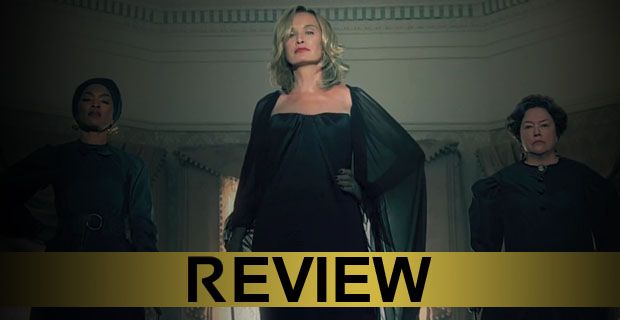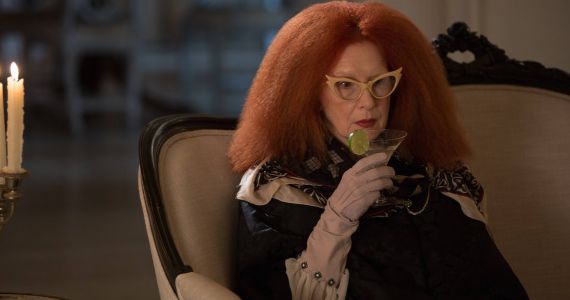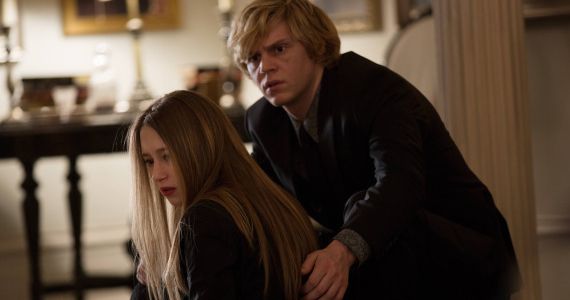[This is a review of American Horror Story: Coven episode 13. There will be SPOILERS.]
-
If the past two seasons are anything to go by, the likelihood of there being some out-of-left-field revelation to wrap up the surprisingly unfussy and yet still imprecise season of American Horror Story: Coven seemed pretty high. That says a great deal about the horror anthology that Ryan Murphy and Brad Falchuk have created. Even after twelve episodes of Coven and its specific differences from season 1 and Asylum, the expectations for mind-bending lunacy are about as strong as the expectation for lax adherence to the already slipshod set of conventions the third season used to define its horror niche.
And yet, unlike the previous two seasons, Coven had been imparted with a specific goal, a clear destination for the narrative and its characters to arrive at come the season finale. This straightforward approach had its advantages and disadvantages in terms of how the story of Miss Robichaux's Academy and its ever-dwindling student base would conclude. For one thing, this idea of there being a road map or particular destination in mind gave the season a much-needed sense of urgency and a prescribed finality to the plot – which, in and of itself, actually felt like a new approach to the series.
Conversely, that destination wound up feeling like a limitation on the expansiveness of the journey between point A and point B. Once it was established that Jessica Lange's Fiona Goode would be losing her witch-y powers and her life so that a new supreme could rise and take hold of the coven she so selfishly allowed to weaken and decline into near ruin, the middle points of the season (i.e., episodes 2-12, with some exceptions, of course) were shackled by the very end the series was headed toward.
That meant there was time for some twiddling of the thumbs, and for a series so enamored with it's own kitchen-sink style of storytelling, that could spell trouble. Instead, Coven may just go down as the season with the most to say about the world outside its specific storyline. But with a storyline that included witches, voodoo priestesses, various flavors of maniacal mothers, a guard-dog constructed from a bus full of dead frat boys, sax-playing serial killers, and a secret society of witch hunters, did its message get lost in the din of so many view points?
Overall, it seems that the answer to that question is: yes. But that's only in terms of there being some kind of weight or purpose behind the message that goes beyond merely pointing out certain societal issues. Other than that, the message was predictably overt, and, in keeping with past seasons, the necessity of social commentary often times felt more than a little tacked-on. There were plenty of powerful examples of what Coven was trying to convey in terms of those who have been marginalized for their gender, race, or sexual preference, but more often than not, that message was lost in the shuffle of too many voices fighting amongst one another.
Perhaps that was the point: to demonstrate how, in the desperate struggle to have one's voice heard, those in the minority may be willing to stifle others in a similar position in order to increase the likelihood of being heard. The thing is, like everything else, that point (if it even was the point) wound up being obfuscated by all the broad strokes with regard to symbolism and characterization. In the end, much of what Coven seemed to be alluding to wound up, as a result of its muddled presentation, feeling too reductive to result in anything approaching empowerment.
Case in point: Within the framework of 'The Seven Wonders,' there is no mention of the marginalization felt by Queenie inside Miss Robichaux's Academy, nor was there any hint that a lasting impression was made by Marie Laveau or Delphine LaLaurie – they were simply forgotten, banished to the nether realm to endlessly play out a gruesome scene of torture befitting their earthly transgressions.
Marie and Delphine certainly got their due comeuppance and that end was gratifying in the same ironic manner the idea of Fiona spending an eternity with the Axeman and his endless supply of catfish and crude entendres was. But it felt as though the episode just folded Queenie's issues into the larger context of the season without reconciling her arc as a character – which ended with Coven treating her and her troubles as something of a construct, rather than an individual with specific needs that maybe have gone unfulfilled.
This is indicative of the broad strokes the show uses that typically result in certain story elements being ignored, in order to achieve a specific intent. It often produces inconsistencies wherein the show doesn't play by its own rules – which may actually be fair, considering said rules haven't been explicitly established. But having rules and forcing the narrative to play within those limitations usually make the story stronger, rather than leave certain situations as nothing more than head-scratchers or hurried attempts to settle the one plot that's working.
Instead, the audience is left with too many questions like: Why does Madison not turn into a ghost like Spalding, Nan, or the Axeman? Or why, after demonstrating tremendous power, would Madison succumb to an enraged FrankenKyle? Not to mention lingering thoughts about Queenie's encounter with the Minotaur, and Zoe's lethal intimacy that have all been brushed away, never to be spoken of again.
Still, those points aside, 'The Seven Wonders' – if taken as a single episode, intent on delivering the one promise the season had alluded to from the beginning – is a fairly entertaining way to send the Coven on its merry way. To a certain degree, it's interesting that Coven wound up focusing on Sarah Paulson's character – or at least, in looking back over the episodes, that the story could be perceived as focusing on her. That's a nice trick for the season to have pulled off, as it offers an incentive for a second viewing, wherein the audiences tries to pinpoint specific moments that may have insinuated Cordelia's rise to becoming the next supreme.
In the end, American Horror Story: Coven managed to deliver on at least one plot point with some sort of dramatic weight. But with so many conversations the show clearly saw as significant being left unanswered, it seems Coven was regrettably content to simply point to problems without wanting to have a deeper discussion of why they persist, what real change might entail, and, more importantly, what it might possibly mean.
_________________________________________________
American Horror Story will continue with season 4 in the fall of 2014 on FX.
Photos: Michele K. Short/FX



